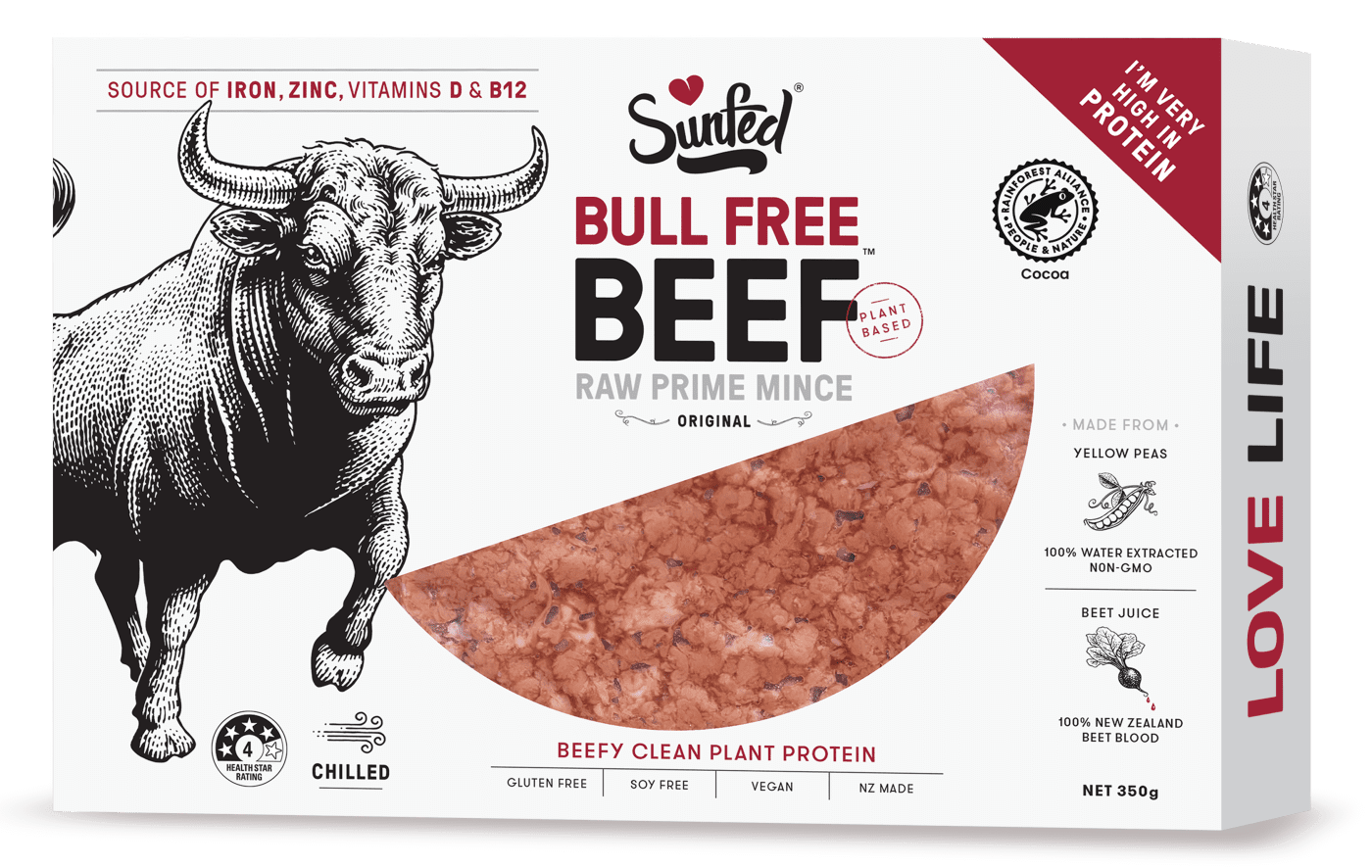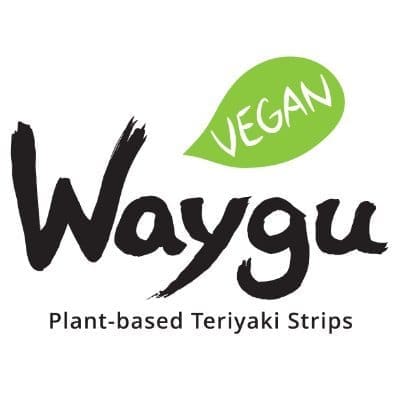
A NZ produced plant-based protein product selling at a major supermarket in Australia. Click on image to enlarge.
DOES this plant product pass muster in terms of labelling clarity?
Australia’s current food labelling regulations would suggest it does.
A loophole created by a review of the Food Standards Code in 2016 allowed products made from plants to include animal descriptors and images in their labels, provided they add “appropriate qualifiers”.
In case you missed it, the appropriate qualifier that allows this product to be labelled as it is can be found in the very small font at the bottom of the package – “beefy clean plant protein”.
Some might suggest the term “bull-free” is another qualifier but that wording offers no indication this is a product made from plants. “Bull-free beef” would apply to most of the beef produced in Australia.
Australia’s Food Standards Code once stipulated that if a product used the word meat, it had to come from a “carcass”.
That wording is still in the code, however, an amendment approved by Australia’s food standards regulator FSANZ in 2016 now enables non-meat products to use meat terminology, provided they are accompanied by the appropriate qualifiers.

Yesterday’s Senate Hearing heard a company has developed “plant based Wagyu”, provoking this reaction from Senator Susan McDonald: “To have these unintended consequences of an earlier change – I mean Wagyu mince? That just doesn’t pass any common sense test in my mind.”
The amendment came after food processing giant Sanitarium lodged a submission to an FSANZ review process seeking to be able to use dairy terms such as milk on the labelling of its plant-based beverage products.
The red meat industry was not consulted about those proposed changes at the time even though the resulting amendment had the significant consequence – intended or otherwise – of allowing plant based products to use meat terms in their labelling as well.
The red meat sector wants the five year old amendment reversed and the loophole closed.
While the issue was deemed important enough to earn the stakeholder support required to amend the code five years ago, the response from FSANZ officials who appeared at yesterday’s Senate Inquiry into meat definitions suggested that calls to change it back again may not be met with same priority status.
Senator Susan McDonald asked if it was correct that to change FSANZ standards, it would require the agreement of all of the States and Territories and both Federal Governments of Australia and New Zealand.
FSANZ interim CEO Dr Sandra Cuthbert responded by saying it would not require a 100 percent consensus decision.
“But for us to do work in this space, we would want to ensure there is an agreement at large that this is an issue that warrants a priority and resources that are allocated to that work to be dedicated in that space, and then there would need to be the same Ministerial support to actually make any changes that could flow on from that.”
Senator McDonald further questioned whether the inclusion of meat products was an “unintended consequence” of the 2016 change to the code.
No so, according to Dr Cuthbert, who said she believed the legislative phrasing in the current form of the code was adequate to ensure clarity so consumers can make an informed choice as to what the food is that they’re purchasing.
“So I am comfortable based on the information that we have seen today that the code and that portion of the code that was modified in 2016 provides the necessary framework to ensure that foods are labelled in accordance with their true nature, provided in a description to ensure that consumers are aware of what it is that they’re purchasing”
“And this is in addition, if I can add, to other information that is available on the packaging … so the ingredient lists and the nutritional information panel that goes in addition to the term used on the label for the name of the food itself.”
FSANZ has opened the floodgates: RMAC
Red Meat Advisory Council chair John McKillop, who appeared soon after the FSANZ officials, said the regulator had “gone out on a limb on this issue”.
“If milk as they have clearly defined it is a secretion of a lactating animal, to then reverse that well established definition by adding that you can call it coconut milk which clearly can’t be a lactating animal, just opens up the floodgates,” he said.
“I am just not sure why FSANZ would think that would be good for the consumer to allow that floodgate to open – everyone was clear what milk was and why they would think they would then have the right to open that up under pressure from manufacturers such as Sanitarium is just beyond me, they have gone well beyond their remit, as they have intended to do recently by going into areas such as environmental credentials around food.”
In his opening remarks Mr McKillop said he wanted to “make it clear from the outset” that the red meat sector was not opposed to plant-based products.
“In fact we see them as a vital part of feeding the world as we move towards 2050 with potentially $9 billion people on the earth,” he said.
“We simply want them to be called what they are and that is not meat and that is not animal based production like we have.”
He said RMAC is seeking is minimum standards to prohibit the use of plant-based products using meat based descriptors such as meat, goat and lamb, but “could live with” such products using processing terminology such as sausage, patty, and mince.
It was well documented that Australia has a low literacy rate and the people who were most likely to be deceived by confusing labelling were those who could least afford to be deceived.
“Those who have low literacy rate, who go into a supermarket and see a picture of a steer or a chicken or a pig and assume that is truth in labelling because that is what Australia does, picks it up and takes it home and realises it has about 27 ingredients in it, it is ultra processed, and they eat it being deceived into thinking what it is because they don’t have that level of literacy that you and I enjoy,” he said.
Mr McKillop said it was interesting to hear FSANZ representatives indicate in the previous session that changes to reverse the 2016 clause would only occur if it was seen as a priority.
“Somehow they saw it as a priority to put that clause in back in 2016 without any consultation with the red meat sector,” he said.
“And I find it odd now to see them suggesting it is probably not a big priority for them to reverse that change.”
“It seems to me that FSANZ has gone out on a limb in deciding what is best for the Australian consumer without any regard with consulting with the Australian consumer or those who might be affected by that.“
Plant-based products not interchangeable with meat
Mr McKillop said alternative protein producers put forward a myth that their product was interchangeable with meat.
“Of course it is not, if you took all of that protein out of the market from the red meat sector or even the other proteins, you are going to have to replace it with a lot more deforestation and a lot more chemical and a lot more synthetic fertilisers to get to that point.”
“…the vegan groups and the plant-based manufacturers seem to imply that this is a guilt free vege burger that you can enjoy without any harm to the environment.
“It is simply not true and in fact the greatest potential to reverse climate change comes from well managed grazing systems and not from cropping systems but yet that is an inconvenient truth to those sectors.
“In closing I think we need to close this loophole because it is infringing in our trademark, and just denigrates the hard work of the all those involved, and that is not just the producers, the workers, the butchers, and everyone else involved in the supply chain.”


Does anyone else find it quite amusing that people pushing the plant based food product need to include meat suggestive descriptors to sell their product. This suggests that they don’t have much faith in the appeal of their product. As for the FSANZ, by allowing this, it borders on fraud. In my humble opinion.
The cheapest most acceptable source of protein is from grass fed animals.
It needs to be put in the supermarket section where you buy yoghurt,butter,margarine & cream.It’s manufactured.
It is surely the time to expedite closure on non meat products. How can consumers understand what they are buying. If it’s plant based , mkt as what its made from .
Right on John McKillop!
Totally agree that if it was a priority to go through hell to make the change with no consultation it must be a priority to reverse it now that it’s known the stakeholders are severely affected.